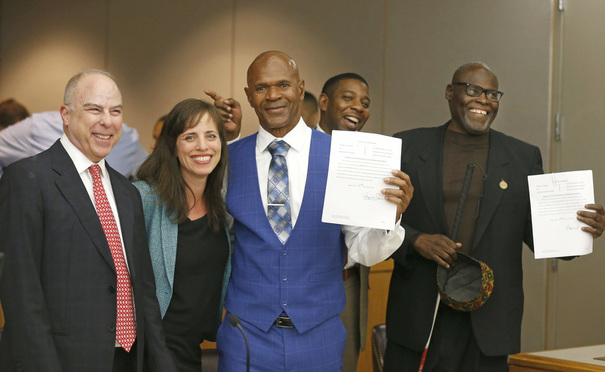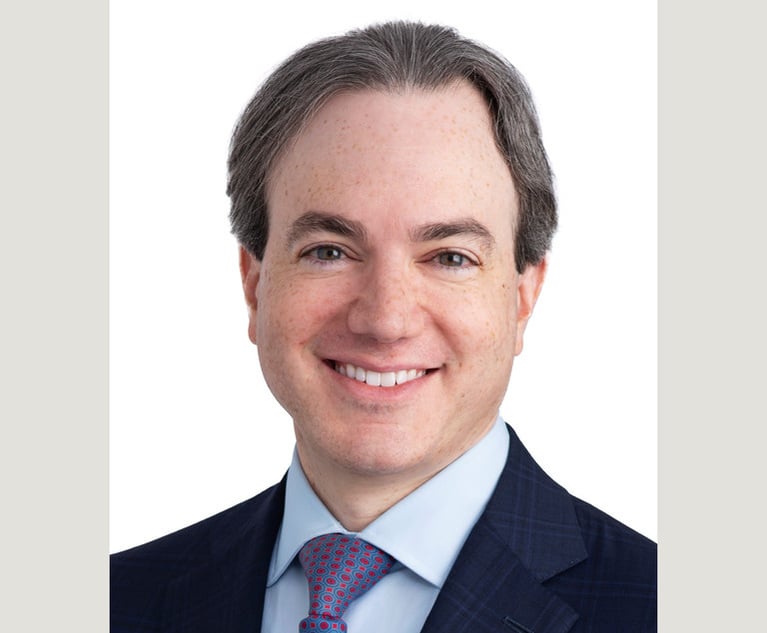Another Happy Day for Lawyers, Clients in 'Actual Innocence' Case
“Nothing in my career is as satisfying as this type of work, where you are able to help get someone exonerated for something they did not do and for which they have spent years in prison,” said attorney Gary Udashen.
May 10, 2019 at 06:53 PM
4 minute read
 From left to right are Innocence Project of Texas Board president Gary Udashen, Innocence Project staff attorney Nina Morrison, and defendants Dennis Allen and Stanley Mozee at a May 10, 2019, hearing in Dallas County's 265th District Court in which Allen's and Mozee's charges for capital murder were dismissed based on actual innocence. Photo: Ron Jenkins/Innocence Project
From left to right are Innocence Project of Texas Board president Gary Udashen, Innocence Project staff attorney Nina Morrison, and defendants Dennis Allen and Stanley Mozee at a May 10, 2019, hearing in Dallas County's 265th District Court in which Allen's and Mozee's charges for capital murder were dismissed based on actual innocence. Photo: Ron Jenkins/Innocence Project
Criminal defense attorneys Nina Morrison and Gary Udashen, collectively, have successfully fought to prove that 47 people were wrongfully convicted.
Yet it never gets old to stand in a courtroom and hear a judge say the words “actually innocent” before crowds of family members and news cameras, as happened Friday for two of the attorneys' clients, Stanley Orson Mozee and Dennis Lee Allen, who were wrongfully convicted of capital murder in 2000.
Prosecutorial misconduct by former Dallas County Assistant District Attorney Rick Jackson led to their wrongful convictions, court records show.
Although Mozee and Allen were released from prison on bond more than four years ago, Friday's ruling makes them each eligible to receive $1.22 million in compensation from the state for the 15 years and three months they were imprisoned, and then $80,000 per year for the rest of their lives.
“Nothing in my career is as satisfying as this type of work, where you are able to help get someone exonerated for something they did not do and for which they have spent years in prison,” said Udashen, board president of the Innocence Project of Texas, who represented Allen and has helped exonerate 20 people total.
It never gets old, said Morrison, staff attorney of the Innocence Project of New York, who represented Mozee.
“Everything is as overwhelming and rewarding as the very first time it happened. It's a great feeling,” she said, noting she's now helped exonerate 27 people.
The two Innocence Projects approached the district attorney's office in 2009 about the cases, and the office's Conviction Integrity Unit opened an investigation. In 2014, the office agreed that Mozee and Allen's convictions should be overturned, according to a statement.
“It was emotional for all of us,” said Dallas County District Attorney John Creuzot, who gave his deepest and sincerest apology at the hearing. “We apologized for what they had gone through, that they had been convicted. Justice is sometimes slow, but it gets there.”
Mozee and Allen were wrongfully convicted of capital murder in 2000 for the robbery and murder of Rev. Jesse Borns Jr., a shopkeeper who was stabbed to death at his business in 1999. Mozee and Allen always maintained their innocence.
In 2014, they both filed writs of habeas corpus arguing that new DNA evidence from blood at the crime scene established their innocence, and that due process violations occurred in their prosecutions. The case went back and forth between the Texas Court of Criminal Appeals and the trial court several times.
Eventually in a 2017 findings of fact and conclusions of law, the high court ruled there was compelling evidence that Mozee and Allen's due process rights were violated. One jailhouse informant who testified that Allen told him he committed the murder had been writing letters to the prosecutor, Jackson, asking him to dismiss his case for his testimony. Yet at the trial, Jackson solicited testimony from that witness who said he did not seek or expect benefits from his testimony. Jackson also never disclosed to defense lawyers that the state had agreements to assist that witness, and three other witnesses, with their criminal matters in exchange for testimony.
Also, a detective at the trial gave false or misleading testimony about three alleged eyewitnesses who supposedly saw Allen use the victim's credit cards. The truth was that one of those eyewitness initially identified Allen in a photo array, but before trial, he recanted his identification of Allen.
Morrison, Mozee's lawyer, said she knows the State Bar of Texas is reviewing the record and findings from the Texas Court of Criminal Appeals to determine whether to take disciplinary action against Jackson, the former prosecutor.
“It's the type of case we would expect the bar to take very seriously,” she said, noting that in past wrongful convictions involving prosecutorial misconduct, prosecutors were disbarred.
Jackson, who didn't return a call seeking comment, is currently on inactive status with the bar.
Claire Reynolds, spokeswoman for the bar's Office of Chief Disciplinary Counsel, didn't return a call seeking comment before deadline.
Read the findings and conclusions.
This content has been archived. It is available through our partners, LexisNexis® and Bloomberg Law.
To view this content, please continue to their sites.
Not a Lexis Subscriber?
Subscribe Now
Not a Bloomberg Law Subscriber?
Subscribe Now
NOT FOR REPRINT
© 2025 ALM Global, LLC, All Rights Reserved. Request academic re-use from www.copyright.com. All other uses, submit a request to [email protected]. For more information visit Asset & Logo Licensing.
You Might Like
View All
Haynes and Boone Expands in New York With 7-Lawyer Seward & Kissel Fund Finance, Securitization Team
3 minute read
'None of Us Like It': How Expedited Summer Associate Recruiting Affects Law Students and the Firms Hiring Them

Big Law Firms Sheppard Mullin, Morgan Lewis and Baker Botts Add Partners in Houston
5 minute read
Trending Stories
- 1Munger, Gibson Dunn Billed $63 Million to Snap in 2024
- 2January Petitions Press High Court on Guns, Birth Certificate Sex Classifications
- 3'A Waste of Your Time': Practice Tips From Judges in the Oakland Federal Courthouse
- 4Judge Extends Tom Girardi's Time in Prison Medical Facility to Feb. 20
- 5Supreme Court Denies Trump's Request to Pause Pending Environmental Cases
Who Got The Work
J. Brugh Lower of Gibbons has entered an appearance for industrial equipment supplier Devco Corporation in a pending trademark infringement lawsuit. The suit, accusing the defendant of selling knock-off Graco products, was filed Dec. 18 in New Jersey District Court by Rivkin Radler on behalf of Graco Inc. and Graco Minnesota. The case, assigned to U.S. District Judge Zahid N. Quraishi, is 3:24-cv-11294, Graco Inc. et al v. Devco Corporation.
Who Got The Work
Rebecca Maller-Stein and Kent A. Yalowitz of Arnold & Porter Kaye Scholer have entered their appearances for Hanaco Venture Capital and its executives, Lior Prosor and David Frankel, in a pending securities lawsuit. The action, filed on Dec. 24 in New York Southern District Court by Zell, Aron & Co. on behalf of Goldeneye Advisors, accuses the defendants of negligently and fraudulently managing the plaintiff's $1 million investment. The case, assigned to U.S. District Judge Vernon S. Broderick, is 1:24-cv-09918, Goldeneye Advisors, LLC v. Hanaco Venture Capital, Ltd. et al.
Who Got The Work
Attorneys from A&O Shearman has stepped in as defense counsel for Toronto-Dominion Bank and other defendants in a pending securities class action. The suit, filed Dec. 11 in New York Southern District Court by Bleichmar Fonti & Auld, accuses the defendants of concealing the bank's 'pervasive' deficiencies in regards to its compliance with the Bank Secrecy Act and the quality of its anti-money laundering controls. The case, assigned to U.S. District Judge Arun Subramanian, is 1:24-cv-09445, Gonzalez v. The Toronto-Dominion Bank et al.
Who Got The Work
Crown Castle International, a Pennsylvania company providing shared communications infrastructure, has turned to Luke D. Wolf of Gordon Rees Scully Mansukhani to fend off a pending breach-of-contract lawsuit. The court action, filed Nov. 25 in Michigan Eastern District Court by Hooper Hathaway PC on behalf of The Town Residences LLC, accuses Crown Castle of failing to transfer approximately $30,000 in utility payments from T-Mobile in breach of a roof-top lease and assignment agreement. The case, assigned to U.S. District Judge Susan K. Declercq, is 2:24-cv-13131, The Town Residences LLC v. T-Mobile US, Inc. et al.
Who Got The Work
Wilfred P. Coronato and Daniel M. Schwartz of McCarter & English have stepped in as defense counsel to Electrolux Home Products Inc. in a pending product liability lawsuit. The court action, filed Nov. 26 in New York Eastern District Court by Poulos Lopiccolo PC and Nagel Rice LLP on behalf of David Stern, alleges that the defendant's refrigerators’ drawers and shelving repeatedly break and fall apart within months after purchase. The case, assigned to U.S. District Judge Joan M. Azrack, is 2:24-cv-08204, Stern v. Electrolux Home Products, Inc.
Featured Firms
Law Offices of Gary Martin Hays & Associates, P.C.
(470) 294-1674
Law Offices of Mark E. Salomone
(857) 444-6468
Smith & Hassler
(713) 739-1250






